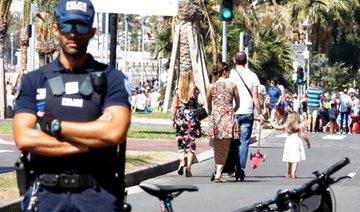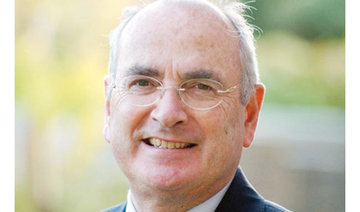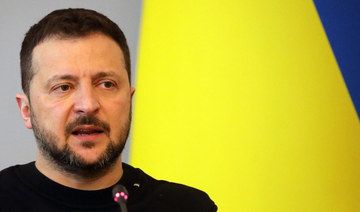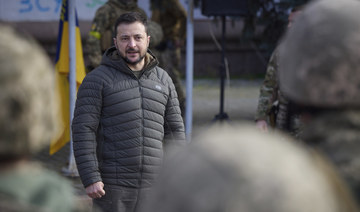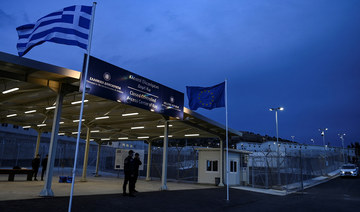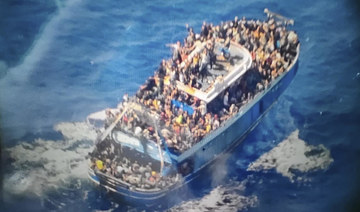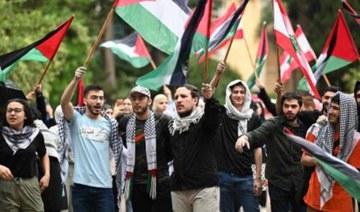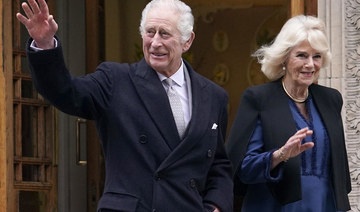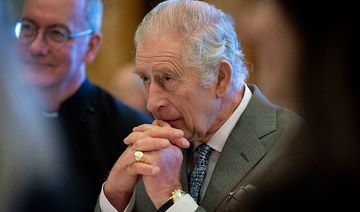WASHINGTON: Returning fighters from the vanquished Daesh pose a grave danger to Europe and the US, but the primary extremist threat comes from people living and radicalized inside their country, US terror experts say.
Even if they have no battleground experience, those who decide to undertake solo attacks, like the two recently in New York, in the name of Daesh or Al-Qaeda are almost impossible to detect in advance.
“In France, the US, or elsewhere, there certainly won’t be any more large attacks planned from abroad like those of Nov. 13, 2015, in Paris,” said Marc Sageman, a former CIA agent and terror expert, referring to the multipronged Daesh operation that left 130 dead.
“Ever since then, attackers here or in Europe have not been guided by Daesh but acted on their own, imagining themselves to be soldiers of an imagined Islamic community which they want to defend or avenge.”
Neither Akayed Ullah, the Bangladeshi immigrant who tried to blow up a New York subway station last week, mainly wounding himself, nor Sayfullo Saipov, an Uzbek who mowed down people on a New York bike path on Oct. 31, killing 8, had any evident contact with Daesh terrorists aside from watching their propaganda videos.
Experts say that kind of self-radicalized attacker, completely unknown to authorities, is the main threat countries face today.
While returning Daesh fighters are definitely a threat, “it’s not a primary concern,” said Albert Ford of the New America think tank.
“The attacks in this country were made by people who were in the country for years. The real danger is with these not very sophisticated but deadly attacks that we saw lately in New York.”
According to New America data, 85 percent of the 415 people accused of extremist-related crimes in the US since the 9/11 attacks have been American citizens. Of them, 207 were born in the US.
They also were not known to law enforcement: Only one fourth had a police record.
“None of the deadly jihadist attacks in the United States since 2014 had a known operational connection to ISIS (Daesh) or its networks,” a New America report says.
On both sides of the Atlantic, homegrown attacks “are obviously the most dangerous,” echoed Thomas Sanderson of the Center for Strategic and International Studies’ Transnational Threats Project.
“Of the 19 last major attacks in Europe, 17 did not have a direct foreign factor element to it.”
Homegrown attackers stay under the radar, giving little away that would alert police, Sanderson noted.
“Their safe haven is their bedrooms. They can prepare at home, they don’t need the footprint of a camp anywhere,” he said.
At the same time, experts say, the threat from Daesh in Syria and Iraq has not disappeared even if the group has been expelled from nearly all of the territory it held.
For those who survive, according to former US undersecretary of defense for intelligence, Michael Vickers, the war is not over.
“Defeating insurgencies always takes time. It ranges from ten years to multi decades. And this one is a global insurgency, with expanded space and expanded time,” he said.
Indeed, Daesh planned for battlefield losses and has a strategy for surviving, noted Bruce Hoffman, a Georgetown University national security expert.
“Two or three years before the Paris attacks, ISIS put in place an external operations network. This network extends beyond Europe,” he noted.
“The traction of that strategy was demonstrated last May when a bomb attack was committed in Manchester, England, against a concert venue. That attack was operated by an ISIS cell operating out of Benghazi, Libya.”
And the returnees, even if they stand a much higher chance of being spotted by police than self-radicalized homegrown attackers, are still part of that network, added Sanderson.
Even if returnees’ numbers have been low, he said: Tthe returning fighters present a massive potential problem because of the skills and the credibility and the motivation.”
Experts say homegrown extremists pose main threat to Europe, US
Experts say homegrown extremists pose main threat to Europe, US
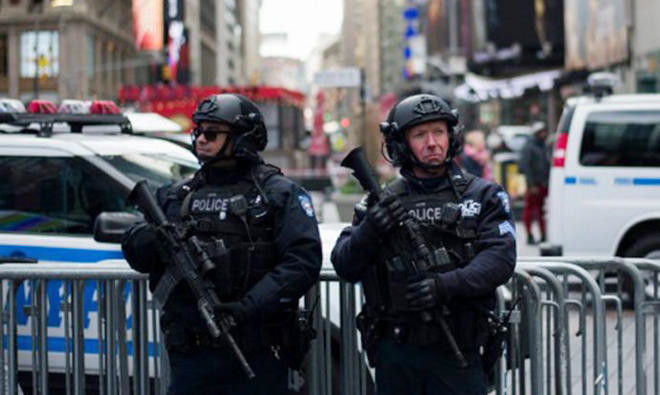
Forest fires raze parts of India amid heat, dry weather
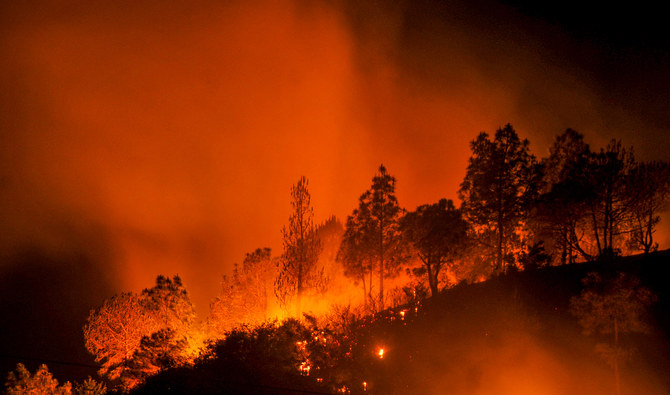
- As of 2021, 54.4 percent of forests in India experienced occasional fires, most of them due to man-made factors
- These fires have picked up again this year, with 653 incidents in Uttarakhand alone, government data shows
NEW DELHI: Frequent fires are razing forests in India’s Uttarakhand state in the north and Odisha in the east amid high temperatures and long dry spells, and the blazes have been worsened by people burning the forest to collect a flower used to brew alcohol.
Data from the state-run Forest Survey of India shows that as of 2021, 54.4 percent of forests in India experienced occasional fires, most of them due to man-made factors.
“Agriculture stubble burning, misconceptions and burning of shrubs to shoo away wildlife are major reasons behind the forest fires,” Swapnil Aniruddh, a forest official in Uttarakhand, told Reuters.
After a brief respite during the previous season from November to April, forest fires have picked up again this year, with 653 incidents in Uttarakhand alone, government data shows.
Odisha’s fires have been exacerbated by people setting parts of the forest ablaze to collect Mahua flowers, which are highly sought after as they are used to brew a popular liquor.
During the current season, 10,163 fire points in Uttarakhand have been detected using the government’s imaging radiometer.
Overall, loss of significant forest cover is a big worry for India as it tries to dramatically reduce its climate-changing emissions.
Among the organizations helping to curb the fires is the Indian Air Force, which has used the aerial firefighting ‘Bambi Bucket’ technique of collecting water from a nearby lake to spray over the region.
The situation may get worse, with India’s weather department predicting more heat-wave days than normal between April and June this year, along with a longer dry spell for Uttarakhand.
Pentagon chief pushes for donation of more Patriot systems to Kyiv
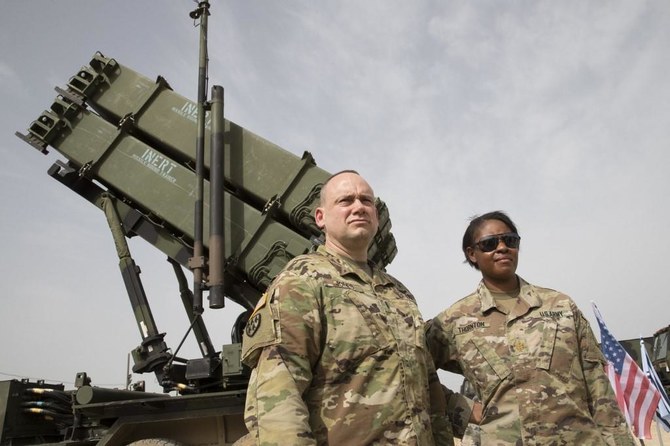
- “There are countries that have Patriots, and so what we’re doing is continuing to engage those countries,” Austin told a House Armed Services Committee hearing
WASHINGTON: US Defense Secretary Lloyd Austin said Tuesday he has been encouraging countries with Patriot missile systems to donate them to Ukraine, which has appealed for more of the air defense batteries.
“There are countries that have Patriots, and so what we’re doing is continuing to engage those countries,” Austin told a House Armed Services Committee hearing.
“I have talked to the leaders of several countries... myself here in the last two weeks, encouraging them to give up more capability or provide more capability,” he said, without identifying the countries by name.
Various European Union countries possess the systems, including Spain, Greece, Germany, the Netherlands, Poland and Sweden.
Ukrainian President Volodymyr Zelensky told NATO members earlier this month that his country needed a minimum of seven additional Patriot or other high-end air defense systems to counter Russian air strikes, urging them to step up their military assistance for Kyiv.
Greek court drops criminal charges against 35 international aid workers
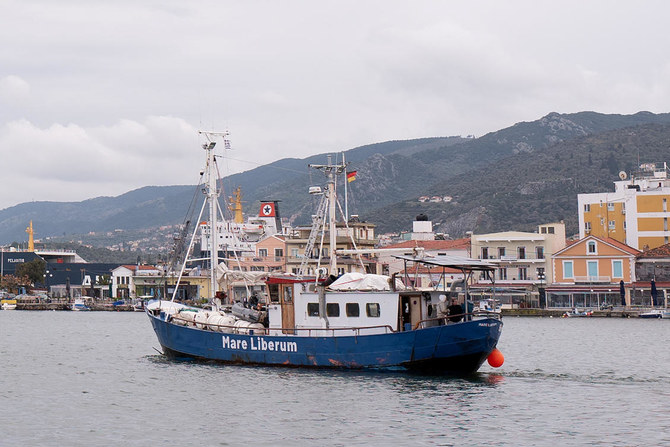
- The case was dropped due to inadequate evidence
- Greece was on the front line of a huge surge of refugees and migrants to Europe in 2015 and 2016
ATHENS: Greece has dropped criminal charges against dozens of international aid workers, ranging from spying to facilitating what authorities had called illegal entry into the country through the island of Lesbos, court documents showed on Tuesday.
Most of the 35 people, accused in 2020 of setting up a criminal organization and providing support to traffickers ferrying migrants, were German nationals. The rest included people from Norway, Austria, France, Spain, Switzerland and Bulgaria. They were arrested and had denied wrongdoing at the time.
The case was dropped due to inadequate evidence, the documents seen by Reuters showed.
“The detailed investigation of the case file has resoundingly quashed the police narrative which was pure fiction,” said Zaharias Kesses, a lawyer representing some of the aid workers.
Greece was on the front line of a huge surge of refugees and migrants to Europe in 2015 and 2016, many through its outlying islands close to Turkiye, including Lesbos. That flow has since ebbed.
The case was based on a 2020 operation by the Greek intelligence service EYP and the anti-terrorism unit with the code name Alkmini, and involved undercover agents who traveled as migrants from Turkiye to Lesbos.
Greek intelligence services were initially involved because the workers, who were using an alarm phone for migrants and asylum seekers in need of rescue at sea, were thought to have passed on information on Greek coast guard movements and vessel equipment.
But a magistrate’s investigation concluded the information and visual material collected were not confidential.
“There is not enough evidence to support the accusations against the defendants,” the documents said.
Top French university loses funding over pro-Palestinian protests
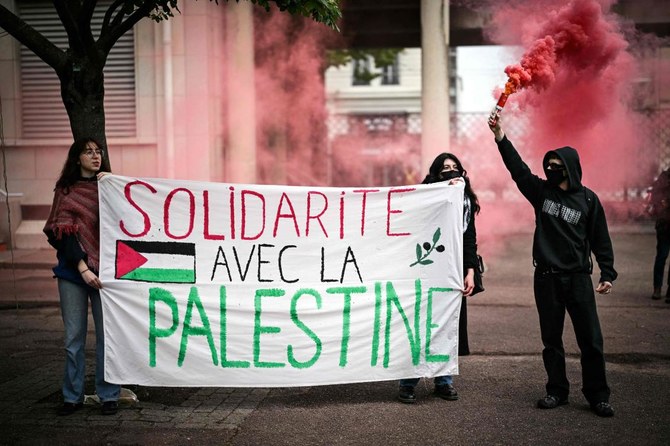
- Regional support for the Paris-based university includes 1 million euros earmarked for 2024
- The university’s acting administrator, Jean Basseres, said he regretted the decision
PARIS: The Paris region authority sparked controversy Tuesday by temporarily suspending funding for Sciences Po, one of the country’s most prestigious universities, after it was rocked by tense pro-Palestinian demonstrations.
“I have decided to suspend all regional funding for Sciences Po until calm and security have been restored at the school,” Valerie Pecresse, the right-wing head of the greater Paris Ile-de-France region, said on social media on Monday.
She took aim at “a minority of radicalized people calling for anti-Semitic hatred” and accused hard-left politicians of seeking to exploit the tensions.
Regional support for the Paris-based university includes 1 million euros earmarked for 2024, a member of Pecresse’s team told AFP.
On Tuesday, the university’s acting administrator, Jean Basseres, said he regretted the decision.
“The Ile-de-France region is an essential partner of Sciences Po, and I wish to maintain dialogue on the position expressed by Mrs.Pecresse,” he told French daily Le Monde in an interview published Tuesday.
In an echo of tense demonstrations rocking many top US universities, students at Sciences Po have staged a number of protests, with some students furious over the Israel-Hamas war and ensuing humanitarian crisis in the besieged Palestinian territory of Gaza.
France is home to the world’s largest Jewish population after Israel and the United States, as well as Europe’s biggest Muslim community.
University officials called in police to clear a protest last week. On Monday, police broke up a student protest demanding an end to Israel’s bombardment of Gaza at Sorbonne, another top French university.
Higher Education Minister Sylvie Retailleau said on Tuesday the French government had no plans to suspend funding for Sciences Po.
Speaking to broadcaster France 2, she estimated the state’s funding for the university at 75 million euros. She said there had been “no anti-Semitic remarks” and no violence had been committed during the demonstrations.
Both Basseres and Retailleau also said there were no plans to suspend Sciences Po’s collaboration with universities in Israel.
Critics on the left have denounced Pecresse’s announcement.
“It’s shameful and an absolute scandal,” said Mathilde Panot, the head of hard-left France Unbowed (LFI) deputies in parliament, adding the behavior of the students was a “credit to the world and a credit to our country.”
Panot and Rima Hassan, a Franco-Palestinian activist who is running on the LFI list for European elections, were on Tuesday questioned in an investigation into suspected justification of “terrorism” over comments on the October 7 attack by Hamas on Israel.
Several hundred people staged a solidarity rally in support of the two women on Tuesday morning.
“In what democracy are counter-terrorism methods used against political activists, community activists and trade unionists?” Panot, 35, told her supporters, who chanted “Resistance” and waved Palestinian flags.
“I want to tell the pro-Israeli lobby organizations behind these complaints that they will not silence us,” added 32-year-old Hassan.
The war started after Hamas’s October 7 attack on southern Israel resulted in the deaths of 1,170 people, mostly civilians, according to an AFP tally of Israeli official figures.
Israel’s retaliatory offensive has killed at least 34,535 people in Gaza, mostly women and children, according to the health ministry in the Hamas-run territory.
Palestinian militants also took some 250 hostages on October 7. Israel estimates 129 remain in Gaza, including 34 believed to be dead.
King Charles III resumes public duties as he fights cancer
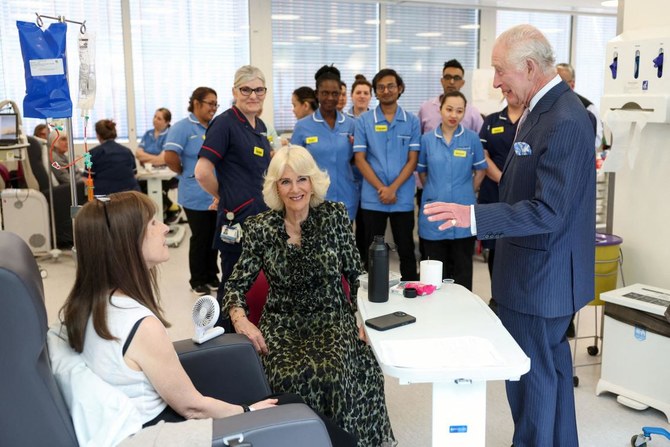
- The British head of state appeared relaxed as he and his wife Queen Camilla met patients and staff at the University College Hospital Macmillan Cancer Center
- He talked to patients receiving chemotherapy at a day unit
LONDON: King Charles III on Tuesday reportedly told fellow cancer patients “I’m well,” as he carried out his first official public engagement since being diagnosed with the condition.
The British head of state appeared relaxed as he and his wife Queen Camilla met patients and staff at the University College Hospital Macmillan Cancer Center in central London.
He talked to patients receiving chemotherapy at a day unit, including 60-year-old Asha Millen, who has bone marrow cancer.
“I said, ‘How are you?’ and he said, ‘I’m well’,” she told reporters afterwards.
Another patient, Lesley Woodbridge, 63, said the king sympathized with her, and added: “I’ve got to have my treatment this afternoon as well.”
Charles, 75, suspended most of his duties in February after cancer was found while he was being treated for an enlarged prostate the previous month.
The exact nature of his cancer has not been disclosed but doctors said last week they were “very encouraged” by the progress of his treatment as an out-patient and “positive” about his recovery.
His daughter-in-law Catherine, Princess of Wales, 42, underwent abdominal surgery in January and said in March that she was receiving chemotherapy.
Again, no details were given about what type of cancer she has. Kate, as she is widely known, is married to Charles’s elder son and heir Prince William.
Tuesday’s event was the first in a number of planned engagements in the coming weeks and designed to raise awareness of the importance of early cancer diagnosis and highlight innovative research, Buckingham Palace said.
Charles, who succeeded his mother Queen Elizabeth II in September 2022, was officially crowned king on May 6 last year.
He has been seen attending church services since his diagnosis and at selected audiences. He has also continued his official state business.
His treatment will continue but his schedule in the coming weeks will be reduced and subject to medical advice, a spokesperson added.
His engagements will include a state visit by Emperor Naruhito and Empress Masako of Japan in June.
The chief executive of University College London Hospitals group, David Probert, said Charles “deliberately went out of his way to meet as many staff and patients as he could.”
Patients were “delighted” to see him, he told Sky News, and described the visit as “incredibly uplifting.”
Members of the public last week welcomed the king’s return to some duties, praising him for raising awareness about cancer, which will affect one in two people, according to Cancer Research UK.
Probert said the king’s announcement had led to a surge in people looking up symptoms and seeking out treatment.
“It’s a huge issue in today’s society,” Keegan Gray, 23, a demolitions manager from New Zealand, told AFP on Friday.
“A lot of people have cancer and a lot of people they keep it to themselves, they’re a bit shy about it,” he added after the news Charles would resume some public duties.
Gray said it was “really beautiful” that the king was raising awareness of cancer and the work of treatment clinics.
Charles and Kate’s cancer diagnoses have created a headache for the royal family, with both having postponed public engagements.
William has also taken a step back to support his wife and their three young children, leaving fewer senior royals to fill the schedule.
Camilla, 76, has stepped in to take over many of her husband’s engagements. Charles’s sister Princess Anne and his youngest brother Prince Edward have also taken on more prominent roles.
Charles’s largely estranged younger son, Prince Harry, is no longer a working royal but is expected in London on May 8 to mark the 10th anniversary of his Invictus Games for disabled military veterans.
He will then join his American wife Meghan on a visit to Nigeria.


